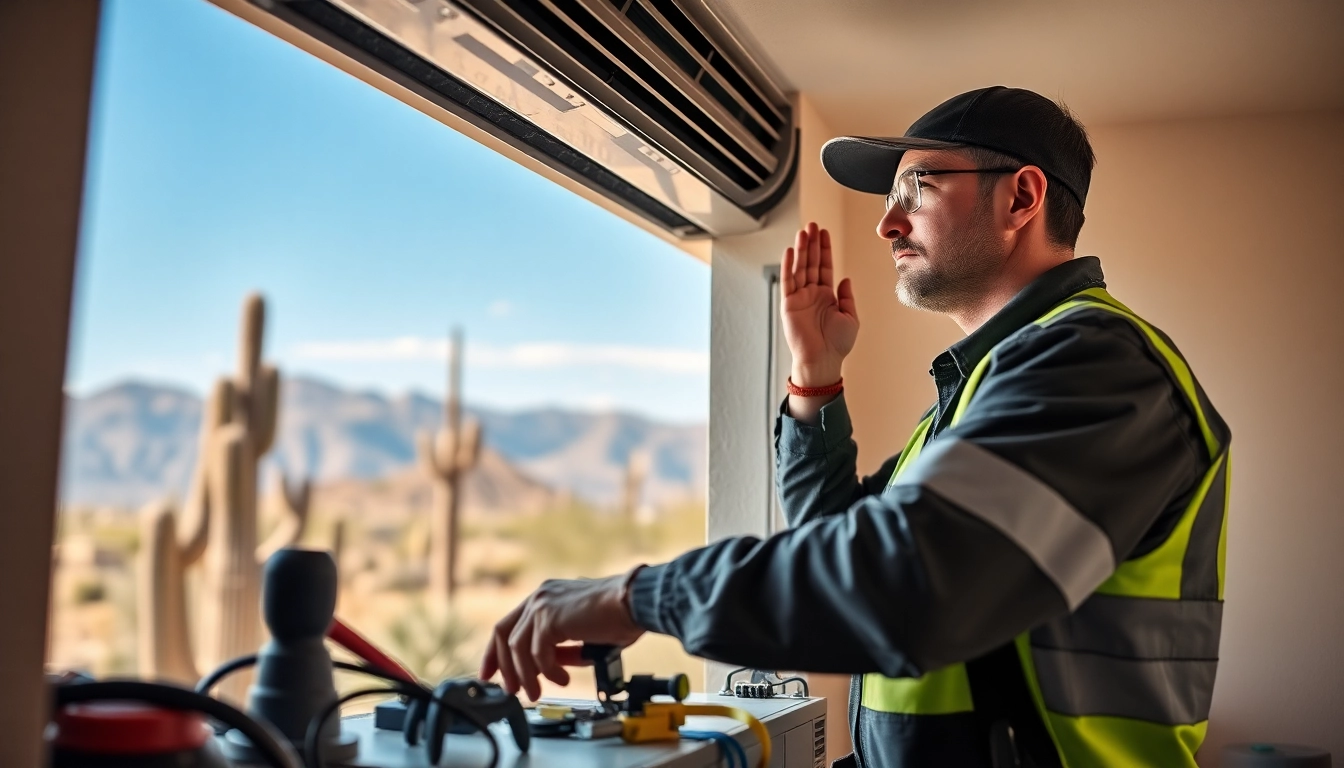Understanding Scottsdale AC Systems
As temperatures soar in Scottsdale, the importance of having a well-functioning AC system cannot be overstated. Properly understanding the various components and functionalities of scottsdale ac systems can not only keep your home comfortable but also enhance energy efficiency and longevity. This comprehensive guide will delve into various aspects of AC systems suited for Scottsdale’s unique climate, maintenance practices, troubleshooting common issues, upgrading systems, and seasonal considerations.
Types of AC Units Common in Scottsdale
In Scottsdale, residents typically opt for a few common types of AC systems that cater to their specific needs:
- Central Air Conditioning: This is the most prevalent type, efficiently cooling larger homes. Central AC units utilize a network of ducts to distribute cool air throughout the home, making them ideal for those seeking uniform temperature control.
- Mini-Split Systems: These are gaining popularity for their flexibility and efficiency. Mini-split systems consist of an outdoor compressor and indoor air handlers that can be independently controlled. This setup is beneficial for homes lacking ductwork.
- Window Units: Often used in smaller apartments or single rooms, window AC units offer a cost-effective solution for cooling specific spaces without undergoing major installation.
- Portable Air Conditioners: These compact units are versatile and can be moved from room to room. They are ideal for renters or those looking for supplemental cooling.
Key Features of Efficient Scottsdale AC Systems
To ensure optimal performance and energy savings, Scottsdale residents should consider key features when selecting an AC system:
- Energy Efficiency Ratings: Look for units with a high Seasonal Energy Efficiency Ratio (SEER) rating. Units with SEER ratings above 15 are generally more energy-efficient.
- Variable Speed Technology: AC units that use variable speed blowers adjust airflow according to cooling needs, leading to improved efficiency and comfort.
- Smart Thermostats: Integrating smart technology allows for precise temperature control, remote operation, and energy monitoring, which can significantly reduce energy costs.
- Advanced Filtration Systems: High-efficiency filters can significantly reduce allergens and dust, ensuring better indoor air quality, which is crucial in desert areas.
Importance of Proper Sizing for Scottsdale AC
Proper sizing of your AC system is crucial for efficiency and comfort. An accurately sized unit will cool your home effectively without excessive energy consumption or frequent breakdowns. Here’s why:
- Under-Sized Units: If an AC system is too small, it will struggle to cool your home, leading to frequent cycling and increased wear.
- Over-Sized Units: Conversely, an over-sized system will cool the space too quickly, preventing adequate dehumidification and resulting in uncomfortable indoor humidity levels.
- Professional Load Calculations: It is advisable to have a professional perform a load calculation, which considers factors such as insulation, square footage, and home orientation to determine the optimal system size.
Regular Maintenance for Scottsdale AC
Regular maintenance is key to keeping your AC system running efficiently throughout the intense Scottsdale summers. This section discusses routine practices that homeowners should adopt.
Benefits of Routine HVAC Check-ups
Scheduling routine HVAC check-ups can offer numerous benefits, including:
- Increased Efficiency: Regular maintenance ensures your system operates optimally, which can result in lower energy bills.
- Extended Lifespan: Regular services help identify and resolve issues before they escalate, extending the lifespan of your AC unit.
- Improved Air Quality: Regular cleaning and filter replacement can enhance indoor air quality, reducing allergens and pollutants in your home.
- Warranty Protection: Many manufacturers require regular maintenance to keep warranties valid. Failing to do so may void coverage.
DIY Maintenance Tips for Scottsdale Residents
Homeowners can perform several simple maintenance tasks to keep their AC systems in top shape:
- Regular Filter Replacement: Check and replace filters every 1-3 months, especially during peak cooling seasons, to ensure efficient airflow.
- Clear Debris: Keep the area around the outdoor unit clear from debris such as leaves and dirt, permitting free airflow.
- Check Thermostat Settings: Ensure your thermostat is functioning correctly and program it according to your comfort needs.
- Inspect Ducts: Check for leaks in your ductwork and consider sealing them to prevent cool air loss.
When to Call a Scottsdale AC Professional
While many maintenance tasks can be completed by homeowners, certain situations warrant professional intervention:
- Frequent Cycling: If your AC is consistently turning on and off, it could indicate a mechanical issue that requires professional assessment.
- Warm Air Flow: If you notice warm air blowing from the vents despite the AC being on, it’s time to call in experts.
- Unusual Noises: Sounds like grinding or hissing can indicate serious mechanical problems that need a technician’s expertise.
- Age of System: If your system is approaching its 10-15 year lifespan, it may be beneficial to have a thorough inspection to assess its efficiency and viability.
Troubleshooting Common Scottsdale AC Problems
Understanding common issues with AC systems and their solutions can help residents address problems effectively when they arise.
Identifying Signs of AC System Failure
Awareness of the signs that indicate an AC system failure is crucial for prompt interventions:
- Inconsistent Temperature: Significant temperature differences between rooms can indicate underlying issues with your AC system.
- Foul Odors: Unpleasant smells can be a sign of mold or bacteria developing in the system, potentially requiring a thorough cleaning.
- Increased Energy Bills: If your bills rise unexpectedly, it may signal inefficiencies in your AC system.
- Water Leaks: Any pooling water around the AC unit is a cause for concern and could indicate a clogged drain line.
Common Repairs Needed for Scottsdale AC
Several common repairs may be required to maintain an efficient and functional AC system:
- Refrigerant Leaks: Leaks require professional attention as they can affect system efficiency and pose environmental concerns.
- Compressor Issues: The compressor is integral to the cooling process. If it fails, the entire system may need replacement.
- Electrical Failures: Problems with electrical connections can cause units to malfunction or not operate at all.
- Drainage Problems: Clogged drains can cause water buildup, leading to potential leaks and mold growth.
Efficient Fixes for Minor Issues
Some minor AC issues can be remedied without professional help:
- Resetting the System: Sometimes, simply resetting the thermostat can solve minor operational glitches.
- Cleaning Drain Lines: Using a mixture of vinegar and water can clear clogged drain lines, reducing the risk of water damage.
- Replacing Filters: Regularly replacing filters helps maintain system efficiency and improves air quality.
- Adjusting Thermostat Settings: Ensure that thermostats are reading accurately and are set to the desired temperature settings.
Upgrading Your Scottsdale AC System
Upgrading your AC system can not only improve comfort but also increase energy efficiency. Here’s what to consider when thinking about an upgrade.
Signs That It’s Time for an Upgrade
There are several indicators that it might be time to consider an AC system upgrade:
- Age of the System: If your AC unit is more than 10-15 years old, it may become inefficient, leading to higher energy costs.
- Frequent Repairs: If your system requires frequent repairs, it may be more cost-effective to invest in a new unit.
- Increased Noise Levels: Loud or unusual noises during operation can signify age-related wear and indicate the need for a replacement.
- Inconsistent Cooling: Difficulty in maintaining a comfortable temperature in your home can suggest it’s time for an upgrade.
Energy-Efficient Options for Scottsdale AC
When upgrading, consider energy-efficient options to reduce your utility bills and environmental impact:
- High SEER-rated Units: Opt for units with a SEER rating of 16 or higher for optimal energy savings.
- Geothermal Systems: These systems use the Earth’s stable temperature for cooling and heating, providing significant energy savings.
- Smart AC Systems: AC systems equipped with smart technology allow homeowners to optimize energy usage through automation and monitoring.
- Solar-Powered Units: Integrating solar panels with your AC system can further reduce reliance on traditional energy sources.
Financial Incentives for New Scottsdale AC Installations
Investing in a new AC system can sometimes pay off through various financial incentives:
- Tax Credits: Certain energy-efficient systems may qualify for federal tax credits, reducing overall costs.
- Utility Rebates: Many utility companies offer rebates for upgrading to energy-efficient systems, benefiting from lower operating costs.
- Financing Options: Look for financing plans that allow you to invest in a system now and pay off the installation over time.
- Improved Home Value: Upgrading to an efficient AC system can enhance your home’s market value, making it an attractive investment.
Seasonal Considerations for Scottsdale AC Use
Given Scottsdale’s hot desert climate, understanding seasonal variations in AC use is crucial for maintaining comfort and efficiency.
Preparing Your AC for Scottsdale’s Hot Summers
Before the onset of summer heat, take steps to prepare your AC system:
- Schedule a Pre-Summer Tune-up: Engage a professional to perform a full system check and service it to ensure optimal performance.
- Clean Condenser Coils: Clear any dirt or debris from the outdoor unit to enhance efficiency and cooling capacity.
- Install a Programmable Thermostat: This allows you to control temperatures based on your schedule, ensuring optimal energy use.
- Seal Windows and Doors: Weatherstrip and caulk around windows and doors to minimize cool air loss and improve efficiency.
Best Practices for Year-Round Efficiency
To keep your AC efficient throughout the year:
- Regular Maintenance: Continue with seasonal check-ups and maintenance to identify issues early.
- Monitor Energy Use: Use energy monitoring devices to track the efficiency and usage patterns of your AC system.
- Optimize Insulation: Insulating your home adequately will reduce the need for excessive cooling and heating.
- Use Ceiling Fans: Ceiling fans can distribute cool air effectively, reducing the burden on your AC unit.
Understanding Scottsdale’s Climate Impact on AC Systems
Scottsdale’s dry desert climate poses unique challenges for AC systems:
- High Temperatures: With temperatures often exceeding 100°F, AC systems have to work excessively hard to maintain comfort.
- Low Humidity Levels: The arid climate can lead to dry indoor air, necessitating the use of humidifiers in conjunction with AC systems to maintain comfort levels.
- Dust and Pollen: The region’s high levels of dust can compromise air filtration systems, necessitating more frequent filter changes.
- Energy Consumption: Awareness of peak energy use during scorching months can help in planning for energy savings and costs.



